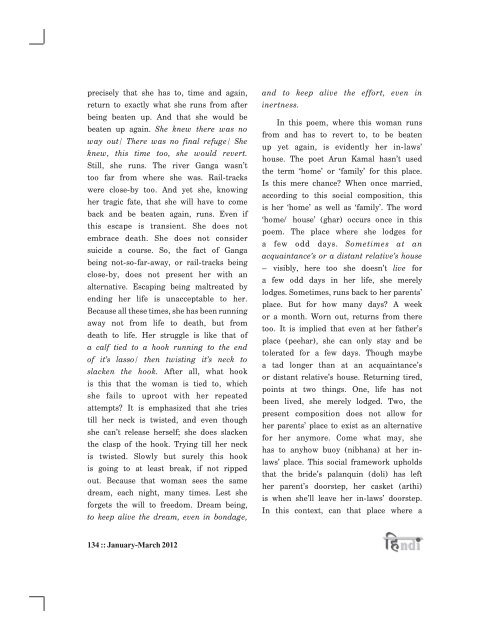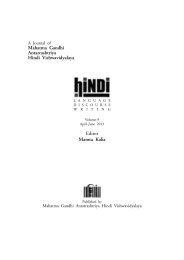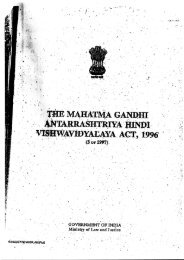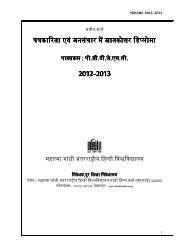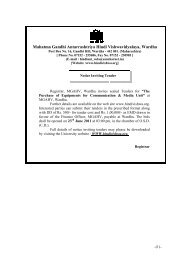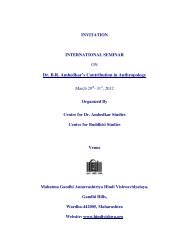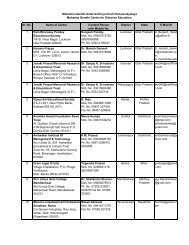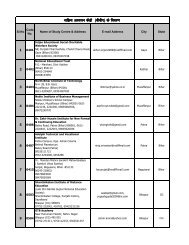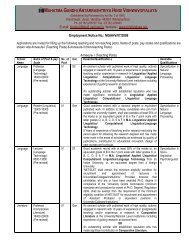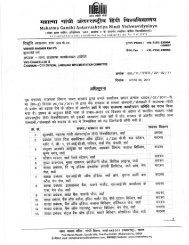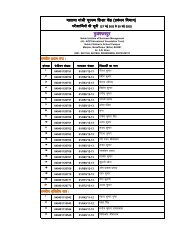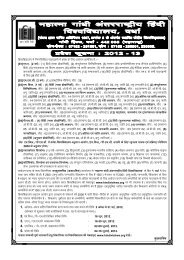A Journal of Mahatma Gandhi Antarrashtriya Hindi Vishwavidyalaya
A Journal of Mahatma Gandhi Antarrashtriya Hindi Vishwavidyalaya
A Journal of Mahatma Gandhi Antarrashtriya Hindi Vishwavidyalaya
Create successful ePaper yourself
Turn your PDF publications into a flip-book with our unique Google optimized e-Paper software.
precisely that she has to, time and again,<br />
return to exactly what she runs from after<br />
being beaten up. And that she would be<br />
beaten up again. She knew there was no<br />
way out/ There was no final refuge/ She<br />
knew, this time too, she would revert.<br />
Still, she runs. The river Ganga wasn’t<br />
too far from where she was. Rail-tracks<br />
were close-by too. And yet she, knowing<br />
her tragic fate, that she will have to come<br />
back and be beaten again, runs. Even if<br />
this escape is transient. She does not<br />
embrace death. She does not consider<br />
suicide a course. So, the fact <strong>of</strong> Ganga<br />
being not-so-far-away, or rail-tracks being<br />
close-by, does not present her with an<br />
alternative. Escaping being maltreated by<br />
ending her life is unacceptable to her.<br />
Because all these times, she has been running<br />
away not from life to death, but from<br />
death to life. Her struggle is like that <strong>of</strong><br />
a calf tied to a hook running to the end<br />
<strong>of</strong> it’s lasso/ then twisting it’s neck to<br />
slacken the hook. After all, what hook<br />
is this that the woman is tied to, which<br />
she fails to uproot with her repeated<br />
attempts? It is emphasized that she tries<br />
till her neck is twisted, and even though<br />
she can’t release herself; she does slacken<br />
the clasp <strong>of</strong> the hook. Trying till her neck<br />
is twisted. Slowly but surely this hook<br />
is going to at least break, if not ripped<br />
out. Because that woman sees the same<br />
dream, each night, many times. Lest she<br />
forgets the will to freedom. Dream being,<br />
to keep alive the dream, even in bondage,<br />
and to keep alive the effort, even in<br />
inertness.<br />
In this poem, where this woman runs<br />
from and has to revert to, to be beaten<br />
up yet again, is evidently her in-laws’<br />
house. The poet Arun Kamal hasn’t used<br />
the term ‘home’ or ‘family’ for this place.<br />
Is this mere chance? When once married,<br />
according to this social composition, this<br />
is her ‘home’ as well as ‘family’. The word<br />
‘home/ house’ (ghar) occurs once in this<br />
poem. The place where she lodges for<br />
a few odd days. Sometimes at an<br />
acquaintance’s or a distant relative’s house<br />
– visibly, here too she doesn’t live for<br />
a few odd days in her life, she merely<br />
lodges. Sometimes, runs back to her parents’<br />
place. But for how many days? A week<br />
or a month. Worn out, returns from there<br />
too. It is implied that even at her father’s<br />
place (peehar), she can only stay and be<br />
tolerated for a few days. Though maybe<br />
a tad longer than at an acquaintance’s<br />
or distant relative’s house. Returning tired,<br />
points at two things. One, life has not<br />
been lived, she merely lodged. Two, the<br />
present composition does not allow for<br />
her parents’ place to exist as an alternative<br />
for her anymore. Come what may, she<br />
has to anyhow buoy (nibhana) at her inlaws’<br />
place. This social framework upholds<br />
that the bride’s palanquin (doli) has left<br />
her parent’s doorstep, her casket (arthi)<br />
is when she’ll leave her in-laws’ doorstep.<br />
In this context, can that place where a<br />
134 :: January-March 2012


